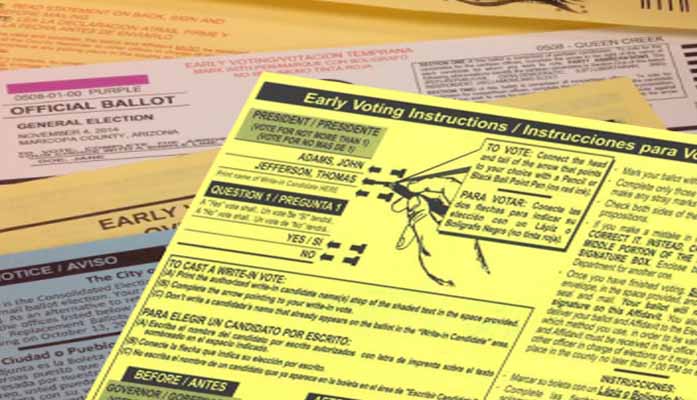
by Corinne Murdock | Apr 19, 2021 | Education, News
By Corinne Murdock |
The Arizona legislature has voted to allow schools to feed teachers during school events – but only if they use Arizona Department of Education (ADE) nutritional guidelines. That means that teacher meals will be constrained to the five food group components of meat/meat based alternatives, grains, vegetables, fruit, and fluid milk.
One of the nutritional standards is zero grams of trans fat. That would nix out fried foods, like doughnuts, and certain baked goods like biscuits or crackers. Further, there are limits on the types of desserts made available. Any grain-based desserts can only be offered at a rate of 2.0 oz/eq of grain a week.
More leeway exists with the USDA guidelines for “Smart Snacks” – those food or drink items sold elsewhere, like through vending machines. It is unclear if the bill will allow schools to provide meals to teachers with foods or drinks that would qualify as “smart snack” items – such as candy or sodas. The “smart snacks” are technically considered “competitive” foods to meals provided through the school.
No analysis of the estimated fiscal impact accompanied the bill.
The Senate passed the bill enabling school boards to provide food and drinks during district events on Tuesday. The bill also clarified that boards acting under this legal authority would be subject to the Arizona Gift Clause.
State Representative Daniel Hernandez (D-Tucson) is the sponsor on the bill. The House Education Committee recommended the bill for passage quickly.
“Statutes don’t explicitly allow school districts to be able to provide food for teacher trainings, board meetings, [etcetera,]” explained Hernandez, in brief.
No further questions were asked of the bill.
Only six House members voted against the bill, all Republican. State Representatives Walter Blackman (R-Snowflake), John Fillmore (R-Apache Junction), Gail Griffin (R-Hereford), Jacqueline Parker (R-Mesa), Judy Burges (R-Prescott), Travis Grantham (R-Gilbert), Jake Hoffman (R-Queen Creek), Bret Roberts (R-Maricopa), and Joseph Chaplik (R-Scottsdale) voted no.
An amendment to the bill, introduced by Hernandez in February, deleted the provision that would’ve enabled school boards to provide food and drinks via a cafe open to the public. Another amendment to the bill was what added the stipulation that these food and drink provisions would be subject to the Arizona Gift Clause, added by the Senate Education Committee.
The Senate passed along the bill quickly without discussion. Six senators voted against the bill, all Republicans again – State Senators Nancy Barto (R-Phoenix), David Livingston (R-Peoria), Kelly Townsend (R-Mesa), Michelle Ugenti-Rita (R-Scottsdale), Sine Kerr (R-Buckeye), and Warren Petersen (R-Gilbert).
The bill will now head to the governor’s desk for approval.
Corinne Murdock is a contributing reporter for AZ Free News. In her free time, she works on her books and podcasts. Follow her on Twitter, @CorinneMurdock or email tips to corinnejournalist@gmail.com.

by Corinne Murdock | Apr 18, 2021 | Education, News
By Corinne Murdock |
2021 marks the seventh year of The Equity Event, an annual speaker series for teachers hosted by the Arizona School Boards Association (ASBA). This event serves as a touchstone for Diversity, Equity, and Inclusion (DEI) initiatives enshrined in school policies statewide.
ASBA characterizes itself as a nonpartisan nonprofit organization that offers training and leadership assistance to public school governing boards.
According to The Equity Event save the date published by ASBA, this year’s Equity Event will have a special focus on culture, race, and ethnicity.
Following the clarifying statement of this year’s focus, the ASBA site insinuated in the following paragraph that the gaps in opportunities and outcomes across school districts might have to do with equity concerning culture, race, and ethnicity.
“Every school district has gaps in opportunity and outcomes,” wrote ASBA. “What are the barriers preventing your district from closing them so that every student can reach their full potential? How can you and your board overcome them?”
The event description continued on to say that past series have uncovered the realities that adversely impact students, such as family income, physical ability, or immigration status. ASBA then stated that culture, race, and ethnicity are related to each of these realities.
Then, ASBA says that race should be focused on more intensely. The association encouraged attendees to become aware of barriers or biases that they aren’t aware existed in themselves.
ASBA has three keynote speakers lined up this year. Calvin Terrell, known for his Ted Talk that advances a kind of secular humanism; Dr. Jennifer Harvey, gay reverend and proponent of antiracism and critical race theory; and Bill de la Cruz, an all-around advocate for racial awareness and diversity, equity, and inclusion initiatives.
A pre-conference to The Equity Event on April 21 will include scheduled appearances from a similar string of guests focused on the Latino and Latina communities in the state.
Guest speakers will be Arizona Poet Laureate Alberto Rios; Executive Director of ALL in Education, Stephanie Parra; President & CEO of Arizona Hispanic Chamber of Commerce, Monica Villalobos; University of Arizona Ph.D. Associate Dean for Community Engagement, College of Social & Behavioral Sciences, Maribel Alvarez; Arizona State University School of Social Work’s Office of Latino Projects Director, Dr. David Becerra; University of Arizona School of Education Educational Policy and Practice Associate Professor, Dr. Nolan Cabrera; Chief Development Officer and Former Valle del Sol Leadership Development Director, Angela Florez; National Association of Latino Elected/Appointed Officials (NALEO) Education Fund Director of Civic Engagement Research, Dorian Caal; and four school board members from across the state, Eva Carrillo Dong, Devin Del Palacio, Monica Trejo, and Tadeo De La Hoya.
One of the guest speakers for the pre-conference, Cabrera, has caused controversy in recent years. His past work within the Tucson Unified School District with Mexican American Studies classes was panned, and in 2019 he accused University of Arizona President Dr. Robert Robbins of not recognizing White Supremacy because Border Patrol agents were visiting a campus career fair.
The rest of the speaker series will focus on equity across all races overall.
The Equity Event will take place virtually from April 22 through the 23. Registration opened March 8, and the deadline to register was Wednesday, April 14.
Corinne Murdock is a contributing reporter for AZ Free News. In her free time, she works on her books and podcasts. Follow her on Twitter, @CorinneMurdock or email tips to corinnejournalist@gmail.com.

by Corinne Murdock | Apr 15, 2021 | Education, News
By Corinne Murdock |
Wednesday, the House passed a bill requiring schools to have parents’ written consent before teaching Sex Education to students. Rather than having parents opt their children out of Sex Ed curriculum, this legislation requires schools to have parents opt in their children.
The bill passed along party lines, with only one Democratic representative abstaining their vote: State Representative Denise “Mitzi” Epstein (D-Tempe).
Summarily, the bill prohibits schools from providing Sex Ed to any students below the fifth grade – including education on AIDS and HIV. It would also require schools to make all Sex Ed curriculum available for parental review two weeks in advance, at minimum.
Under the bill, schools may or may not choose to implement a Sex Ed curriculum. If they do, the bill would simply require them to prioritize parental consent and communication, and those schools would have the option for state-level health or education officials to review the materials. It would also require that AIDS and HIV education be grade-level appropriate, promote abstinence, discourage drug use, and dispel myths of HIV transmission.
The legislation also requires that all committee meetings to develop, adopt, revise, or update Sex Ed courses be open to the public. Additionally, all materials must be made available and two public hearings must occur at least 60 days prior to any approval of materials.
Both Arizona House and Senate Democrats tweeted against the passage of the bill.
“This bill is a huge step back from the progress Arizona made in 2019 when we removed barriers for LGBTQ+ representation in schools. This bill makes all HIV/AIDS instruction opt-in, labeling this important education as taboo & only available via a permission slip,” wrote the Arizona Senate Democrats.
Neither the House or Senate GOP or the bill’s sponsor, State Senator Nancy Barto (R-Phoenix), published remarks on social media regarding the passage of this bill. Barto did tell reporters in an emailed statement that this served as a victory for parents’ rights.
“Parents should not have to worry about what schools are teaching their children about human sexuality,” stated Barto. “Too often parents learn after the fact that explicit or controversial materials were presented without their knowledge or consent.”
As AZ Free News reported previously, the Senate passed the bill early last month. Testimonies presented during committee hearings relayed a variety of issues. These included schools telling children that sex education classes are mandatory, refusing to share curriculum materials with parents, or circumventing parental notification on certain materials like “Genderbread.”
The legislation will now heads to Governor Doug Ducey. If signed into law as written, schools would have until December 15 of this year to comply.
The Arizona School Board Association condemned the bill’s passage as an effort to “undermine the authority of school boards. However, nothing in the bill prohibits school boards from approving curriculum. It merely sets a grade-level requirement and provides parents with an opportunity to exercise their authority over their own children.
Corinne Murdock is a contributing reporter for AZ Free News. In her free time, she works on her books and podcasts. Follow her on Twitter, @CorinneMurdock or email tips to corinnejournalist@gmail.com.

by Corinne Murdock | Apr 14, 2021 | News
By Corinne Murdock |
According to the latest polling of Arizona voters, a sweeping majority support strong voter ID requirements and cleaning up early vote-by-mail lists. A total of 550 voters were polled. 82 percent of them supported voter ID in general, with nearly 64 percent in support of requiring ID verification in order to vote by mail.
Although the majority of respondents in support of voter ID requirements were Republicans, a significant amount of Democratic respondents supported them as well. 42 percent of Democratic respondents supported ID requirements for vote-by-mail. Nearly 69 percent of Democratic respondents supported ID requirements for all who vote.
The poll results come as the Arizona state legislature considers bills addressing those very matters. SB1713 would require a form of voter ID for mail-in voting, such as a driver’s license number and signature. That bill has already passed the Senate, and is progressing through the House. SB1485 would clean up the early vote-by-mail lists; it was last retained on the House calendar after passage by the Senate.
The primary majority of respondents were 65 and older, but the second-largest class of respondents fell in the 18 to 34 category. A poll released by the Harvard Institute of Politics before the 2020 election assessed that a majority of 18 to 29-year-olds displayed Democratic leanings with their intent to vote for President Joe Biden.
Although a slight majority of respondents considered themselves Republicans when asked about how they were registered to vote, the greater majority classified themselves as “moderate” rather than conservative when asked what they would classify themselves. The greatest number of respondents either had attended college and not achieved their degree, or received their bachelor’s only. And, the greatest number of respondents were nearly split in their voting patterns, having either voted in all of the last four general elections or none of them.
60 percent of respondents hailed from Maricopa County. That particular county has made headlines for a number of election-related controversies. Several weeks ago, the Arizona Senate hired four companies to audit the county’s results from the 2020 election. The results of that audit are pending. Last week, Republican leaders reached their goal to cover the audit expenses.
The Arizona Free Enterprise Club and Heritage Action sponsored the survey.
In a press release shared with AZ Free News, Arizona Free Enterprise Club President Scot Mussi explained that the poll reflects that Arizona voters hold a positive view of stricter voting regulations despite opposing media coverage.
“During the past two weeks, the public has heard nothing but negative attacks from the media on the issue of election integrity,” said Mussi. “This poll clearly shows that most voters support reasonable laws that protect our election process, despite no organized campaign in support of these reforms.”
Corinne Murdock is a contributing reporter for AZ Free News. In her free time, she works on her books and podcasts. Follow her on Twitter, @CorinneMurdock or email tips to corinnejournalist@gmail.com.

by Corinne Murdock | Apr 11, 2021 | News
By Corinne Murdock |
A swim coach is challenging the city of Scottsdale over its apparent favoritism in granting a private swim club exclusive access to city pools. The Goldwater Institute and American Freedom Network have joined the fight; they say the city’s actions have created a monopoly on public resources, and therefore are a violation of the Arizona Gift Clause. The coach backed by Goldwater, Joe Zemaitis, founded and oversees a K-12 swim club in the Metro Phoenix area called Swim Neptune. According to Zemaitis, their club has been attempting to gain access to Scottsdale public pools since 2007 – well over a decade.
Swim Neptune was never granted entry to the pools. However, Scottsdale always allowed entry for one private, city-sponsored team: the Scottsdale Aquatic Club. What’s more, that swim club reportedly received entry at a greater discounted rate. Despite Swim Neptune offering far greater compensation for pool access, the city would only admit the Scottsdale Aquatic Club. The Goldwater Institute claims that this violates Arizona’s Gift Clause prohibiting the government from giving gifts to private entities.
In a press release issued by the Goldwater Institute, Zemaitis summarized the city’s various methods of rejection in response to their club’s many requests for access.
“Since 2007, we’ve been aggressively pursuing space in the Scottsdale pools,” said Zemaitis. “They seem to reinterpret the rules and rewrite the rules every time we are eligible under their criteria, they change them again to try to freeze us and our residents out, and it’s simply not fair.”
In a press release, the Goldwater Institute said that families have suffered due to the city’s actions.
“Scottsdale’s unconstitutional actions against Swim Neptune are preventing the swim club’s Scottsdale families from using facilities that they’re already paying for with their taxes. That means that these families have to drive to surrounding cities to get swim lessons, eating up more time and money for something they should be able to get in the town they live in. One of those kids, 14-year-old Ethan Mindlin, was cut from the Scottsdale Aquatic Club when he was younger—and today, he’s won an Arizona state championship for swimming with Swim Neptune. But his family has to drive 45 minutes each way to take him to practice because Scottsdale has turned their back on him.”
In an interview with AZ Free News, National Litigation Director for the Goldwater Institute Jon Riches shared further insight about the relationship between the city and Scottsdale Aquatic Club.
“The team’s been there for several decades. I think part of it is sort of bureaucratic inertia. The city and this particular team always had this strange, cozy relationship,” said Riches.” The city wants to continue to pursue it at the exclusion of other groups. I don’t know exactly the ‘why.’ The most dangerous phrase in the English language is, ‘We’ve always done it this way.’”
Riches explained that Zemaitis reached out to the Goldwater Institute years ago when his issues with the city were happening initially. At the time, their team referred Zemaitis’ case to the American Freedom Network – Goldwater’s network of pro-bono attorneys. Their attorneys sent the city of Scottsdale a letter, which prompted the city to put the pools out to bid.
Zemaitis and Swim Neptune didn’t receive relief at that point, because the city quickly canceled the bid and awarded Scottsdale Aquatic Club access. That’s when their case first went to trial.
After the case was appealed, Goldwater stepped in. Their team recognized similar patterns of potential Gift Clause violations. Riches stated that this case tackled a new issue presented under the clause: public resources versus expenditures.
“The government can’t spend public expenditures on private purposes,” asserted Riches. “[This case explores] what the test [is] for public resources for the exclusive benefit for private parties.”
Riches shared that they may receive a decision by the court by the end of this year, or early next year at the latest.
“This isn’t fair for [Zemaitis] or his kids. If the city can give special interests and treatment in this case, they can give anybody special treatment,” said Riches.
Corinne Murdock is a contributing reporter for AZ Free News. In her free time, she works on her books and podcasts. Follow her on Twitter, @CorinneMurdock or email tips to corinnejournalist@gmail.com.





